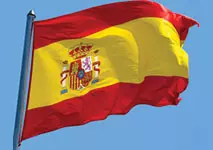Spanish Casinos
Looking for top rated online casinos in Spain? Explore our expert picks of Spanish-friendly casino sites with convenient payment options below.
The warm climate and the sea may render Spain a desirable tourist destination for millions of people around the world, but the residents’ relaxed attitude towards life extended to the country’s stance on gambling, with a number of brick-and-mortar and online casinos remaining unregulated for years. Yet, participating in different forms of gambling is a popular pastime among many Spanish residents, as various reports suggest that players from the country collectively spend as much as €1.9 billion on betting per year.
The financial crash of 2008 put an end to the unregulated market in the country and led to the enforcement of the so-called Spanish Gambling Act, with lawmakers adopting a stricter attitude towards all gambling activities that take place on Spanish soil. Since 2011, licensed Spanish online casinos have been available, with the Regulation of Gambling Activities (Direccion General de Ordenacion del Juego – DGOJ) being the body responsible for the regulation of this market. Licenses to Spanish online casino operators are also issued by the DGOJ.
Best Spanish-Friendly Casinos
To make your choice of a Spanish-friendly casino both easier and more informed, we have compiled a list of the best virtual casino brands that cater to players based in Spain. These casinos make sure that players have the best gaming experience from the jumping-off point of their journeys, with generous welcome offers providing bountiful match bonuses. Meanwhile, recurring offers will help returning players make the most of their gaming experience as they play their favorite casino games.
Mobile compatibility, smooth payments, and great gaming diversity are just a few of the perks Spanish players can enjoy at any of the brands we have listed below. If you are wondering which brand to join, you can check the short reviews and concise casino information we have provided below.
Spain’s Legal Stance on Online Gambling
 Gambling in brick-and-mortar venues has been legal on the territory of Spain for nearly forty years, but the country did not enforce proper regulations on this market until recently. Currently, both online and offline gambling are legal and regulated on a national level, but this was not always so. Games of skill became legal in 1977 while slot machines and other similar games that are based on luck were approved in 1981. It is fair to say the land-based gambling industry in the country is flourishing, as there are over sixty licensed gambling venues and as many as seven racetracks across Spain at the present moment.
Gambling in brick-and-mortar venues has been legal on the territory of Spain for nearly forty years, but the country did not enforce proper regulations on this market until recently. Currently, both online and offline gambling are legal and regulated on a national level, but this was not always so. Games of skill became legal in 1977 while slot machines and other similar games that are based on luck were approved in 1981. It is fair to say the land-based gambling industry in the country is flourishing, as there are over sixty licensed gambling venues and as many as seven racetracks across Spain at the present moment.
The thriving land-based gambling market has led to several changes to Spanish legislation regarding interactive betting as well. In 2006, the country’s government officially enforced its first laws concerning interactive gambling, with online sports betting being the first form of gambling to be subject to regulation. The government proceeded with setting up a special commission in 2010 in order to outline the guidelines on how a properly regulated interactive gambling sector should operate.
This led to the introduction of one very important piece of legislation, namely the 2011 Spanish Gambling Act. The latter was officially enforced in 2012 and all forms of online gambling in the country became legal. The Act allowed for a more holistic approach towards gambling regulations – the 17 autonomous communities in Spain oversee land-based betting activities, while the central government in the capital, Madrid, controls gambling regulations at a national level.
The autonomous communities are currently responsible for land-based operations only, while interactive gambling activities, which take place over the internet and thus transcend the country’s physical borders, are overseen by the state, namely the General Directorate for the Regulation of Gambling Activities. The Spanish Gambling Act also covers the promotion and sponsorship of gambling activities. Thus, foreign gambling operators that do not hold valid licenses from the local regulatory body are prohibited from advertising their services and products to Spanish residents. The advertisement and promotion of gambling activities by local media are also subject to authorization from the government.
-
888casino
Well-experienced gaming brand 888casino offers a broad spectrum of casino entertainment options, featuring titles from a plethora of leading software providers. This enriches the gaming experience for players, including those from Spain, who can access their dedicated platform, www.888casino.es, fully compliant with the regulations set by Spain’s regulatory body, DGOJ.
Website 888casino.com Licenses Gibraltar Regulatory Authority, UK Gambling Commission, MGA, Alcohol and Gaming Commission of Ontario, Ireland's Revenue Commissioners, Sweden, Danish Gambling Authority, Italy, Spain, Portugal Year Established 1997 Support Channels support@888casino.com Available Bonus Welcome Bonus: $25 No Deposit Bonus Compatibility Android, Apple, Windows Deposit Methods Bank Wire Transfer, Payz, MasterCard, Neteller, PayPal, Paysafe Card, instaDebit, Visa, Sofort, Boleto, QIWI, Trustly, Skrill, AstroPay Card, WebMoney, iDebit, MuchBetter, Apple Pay, Rapid Transfer, Bitcoin, Interac, iWallet, Online Bank Transfer, Neosurf, EPS, Pix Withdraw methods Bank Wire Transfer, MasterCard, Neteller, PayPal, Visa, Wire Transfer, Payz, QIWI, Skrill, WebMoney, iDebit, MuchBetter, Rapid Transfer, Trustly, Pix, Interac Spanish aficionados of live casino action will find themselves at home with 888casino’s live dealer section. This segment of the casino delivers a real-life gambling atmosphere directly to your screen, featuring professional dealers and a wide selection of options, including blackjack, roulette, and various engaging live game shows.
To add to the excellent selection of diverse RNG-based and live casino games, 888casino also offers a suite of bonuses tailored to new and existing players. Spanish gamers can enjoy specific promotions, enhancing their overall casino experience. With robust licensing and a secure platform, 888casino stands as a premier destination for safe and enjoyable online gaming.
Pros- Renowned Providers: Hosts games from top software developers like NetEnt, Playtech, and Pragmatic Play.
- Diverse Payment Options: Supports a wide range of deposit and withdrawal methods, including cryptocurrency.
- Mobile Compatibility: Offers games that are fully optimized for mobile devices.
- eCOGRA Certification: Ensures fair play and high payout rates, reported at 96%+ for all games combined.
- Extensive Experience: A trusted name in online gaming since 1997.
Cons- Limited Live Chat: Live chat support is only available for registered members.
- Country Restrictions: Faces multiple country restrictions, limiting access for players in certain regions.
- Bonus Requirements: Table games contribute minimally to meeting bonus wagering requirements.
-
Casumo Casino
Casumo Casino presents an extensive collection of gaming titles, provided by a diverse array of software developers. This casino stands out for its unique approach and is easily accessible to Spanish players through its dedicated platform, www.casumo.es, which is fully licensed by the DGOJ, ensuring a secure and regulated gaming environment.
Website casumo.com Licenses Malta Gaming Authority, Swedish Gambling Authority, UK Gambling Commission, Gibraltar Regulatory Authority, Alcohol and Gaming Commission of Ontario, DGOJ Year Established 2012 Support Channels hey@casumo.com Available Bonus 100% Bonus up to £25 and 20 Bonus Spins Compatibility Android, Apple, Windows Deposit Methods Bank Wire Transfer, MasterCard, Neteller, PaysafeCard, Visa, iDEAL, Giropay, Skrill, PugglePay, MuchBetter, Sofort, CashtoCode, Payz Withdraw methods Bank Wire Transfer, Neteller, Visa, Skrill, MuchBetter, Payz For Spanish enthusiasts looking for an immersive casino experience, Casumo offers a wide range of live casino options, including blackjack, roulette, and baccarat, all hosted by professional dealers. Live game shows will also add to the exciting casino experience Spanish players can enjoy at Casumo. This blend of traditional and contemporary games, available both on desktop and mobile platforms, ensures that every player finds their favorite titles.
Beyond its vibrant live casino and vast game selection, Casumo attracts players with enticing bonuses, including a unique “adventure” promotional system, dedicated to loyal casino members. The brand also emphasizes responsible gaming and secure transactions, making it a top choice for players seeking a trustworthy online casino experience with the added convenience of services tailored to the Spanish market.
Pros- Recognized with numerous eGaming awards.
- Houses popular progressive jackpot slots.
- Boasts very high withdrawal limits.
- Optimized website for mobile use.
- Rapid and professional customer service.
- Wide array of live dealer games.
Cons- Some providers are not available in all regions.
- Not all payment methods are accessible globally.
- Multiple restricted countries.
- Lacks phone support.
- Charges for withdrawals under £10.
-
Betway Casino
Betway Casino rolls out a gaming paradise, boasting an eclectic mix of hundreds of casino games powered by industry giants like Microgaming, NetEnt, IGT, and several other top providers. This high-caliber selection guarantees Spanish players access to an unrivaled gaming experience right at their fingertips. To be able to play, Spanish players must access the domain betway.es, operating under the vigilant regulation of Spain’s watchdog, DGOJ.
Website betway.com Licenses Malta Gaming Authority, UK Gambling Commission, Western Cape Gambling and Racing Board, Gaming Commission of Ghana, DGOJ Year Established 2005 Support Channels support@betway.com Available Bonus Welcome Bonus: Up to $1,000 Deposit Bonus Compatibility Android, Apple, Windows Deposit Methods Bank Wire Transfer, ClickandBuy, Payz, Maestro, Mastercard, Neteller, PayPal, Paysafecard, Ukash, Visa, Entropay, Sofort, POLi, Giropay, EPS, Boleto, Euteller, Neosurf, QIWI, Trustly, Skrill, AstroPay Card, WebMoney, Rapid Transfer, Klarna Instant Bank Transfer, MuchBetter Withdraw methods Bank Wire Transfer, Neteller, PayPal, instaDebit, Visa, Entropay, Payz, EZIPay, QIWI, Skrill, MuchBetter In addition to an extensive slot collection, Betway Casino brings the essence of Vegas to Spanish players with a live casino section that’s always buzzing. Roulette wheels spin round the clock, blackjack cards fly, and the excitement of live baccarat and game shows like Deal or No Deal Live unfolds in real-time, promising a blend of thrill and authenticity.
Betway Casino, established under the umbrella of the Betway gaming network, stands out with its commitment to security, showcasing SSL encryption to safeguard player data. With licenses from both Malta and the UK Gambling Commission, Betway Casino ensures a safe and fair playing field where players can fully enjoy their gaming time. Meanwhile, the Spanish regulator ensures that players residing in Spain can enjoy generous bonuses, swift banking methods, and responsive customer support, making Betway a top-tier destination for online gaming enthusiasts.
Pros- Diverse Banking Options: Offers a wide range of deposit and withdrawal methods, catering to a global audience.
- Extensive Game Library: Features over 450 games from Microgaming, including slots, table games, and video poker options.
- Reputable Casino: Over 20 years of experience in the online gaming industry, with high levels of player trust.
- Security: Utilizes SSL encryption to protect player data and is routinely audited by eCOGRA for fairness.
- Mobile Support: Provides a dedicated mobile casino app for Android and iOS devices, in addition to instant play and mobile versions.
Cons- Country Restrictions: Not available to players in multiple countries, limiting its accessibility.
- Slots-Focused Bonus: The welcome bonus primarily benefits slots players, which might not appeal to all.
- High Playthrough Requirements: Bonuses come with fairly high wagering requirements, making it challenging to clear.
-
Bwin Casino
To offer the best online casino experience, bwin spreads a vast entertainment landscape, offering players an array of casino games from a multitude of software developers. This robust selection is fully available to Spanish gamers who can access the games on the bwin.es platform, fully licensed by Spain’s DGOJ, ensuring a secure and regulated gaming environment.
Website bwin.com Licenses Gemeinsame Glücksspielbehörde der Länder (GGL), Gibraltar Regulatory Authority, UK Gambling Commission, Malta Gaming Authority, Kahnawake Gaming Commission, Alcohol and Gaming Commission of Ontario, DGOJ Year Established 2001 Support Channels support.en@bwin.com Available Bonus Welcome Bonus 100% up to €300 + 50 Free Spins Compatibility Android, Apple, Windows Deposit Methods Bank Wire Transfer, Visa, MasterCard, Maestro, Google Pay, Pix, Interac, Luxon Pay, OXXO, SPEI, Todito Cash, Transferencia Bancaria Local, Boleto, ePay, EPS, instaDebit, Neteller, PayPal, Paysafecard, Postepay, Skrill, Sofort, Trustly Withdraw methods Bank Wire Transfer, Visa, Maestro, MasterCard, Google Pay, Pix, Transferencia Bancaria Local, Interac, Luxon Pay, oxxo, SPEI, EPS, instaDebit, Neteller, PayPal, Paysafe Card, Skrill, Sofort, Trustly At bwin, Spanish players can dive into the thrill of live casino games, where real dealers host live roulette, blackjack, and poker tables. This immersive experience is complemented by exclusive game shows, bringing a slice of excitement right into the comfort of your home, all while supporting seamless gameplay on both desktop and mobile devices.
Beyond its diverse game offerings, bwin stands out with its commitment to player convenience and security. With a variety of payment methods, responsive customer support accessible through multiple channels, and a user-friendly interface, bwin caters to the needs of its Spanish audience, offering personalized promotions and bonuses to enhance its gaming experience.
Pros- Licensed in Germany for a regulated gaming experience.
- Live chat ensures swift support.
- Mobile-friendly design for gaming on the go.
- Sportsbook and online poker expand gaming options.
- High security maintains player data protection.
Cons- The lack of table or live games for German players restricts options.
- The absence of demo games limits trial opportunities.
-
Betsson Casino
Betsson Casino stands out for its diverse array of games, courtesy of a wide range of leading software providers, ensuring a rich and varied gaming experience. Spanish players can easily access this vibrant casino via the www.betsson.es domain, enjoying the full suite of games under the secure oversight of the DGOJ.
Website betsson.com Licenses Swedish Gambling Authority, Malta Gaming Authority, DGOJ Year Established 2001 Support Channels support-en@betsson.com Available Bonus 100% up to SEK 500 + 100 free spins on Book of Dead Compatibility Android, Apple, Windows Deposit Methods Debit cards by Mastercard, Visa, Maestro, Neteller, Paysafecard, Skrill, and more Withdraw methods Bank Wire Transfer, Mastercard, Neteller, Skrill, Trustly, Visa, and others With Betsson Casino, gaming enthusiasts from Spain can dive into an impressive live casino atmosphere, featuring all the classics such as blackjack, roulette, and baccarat, with all games being streamed in real time. Thanks to software providers like Evolution Gaming and Playtech, Spanish players can also explore a variety of live game shows, making their online gaming experience even more riveting. Not only does the platform support a multitude of languages but it also offers localized bonuses, making it a prime destination for Spanish-speaking players.
The casino doesn’t just excel in gaming variety, as it also provides substantial support for responsible gaming, with detailed tools and options for setting limits and self-exclusion. Furthermore, with its commendable customer support, available around the clock, Betsson Casino ensures a secure, enjoyable, and responsible gaming environment for players from Spain and abroad.
Pros- A quick withdrawal process
- High limits for withdrawals
- Extensive range of game providers
- Offers popular progressive slots
- Phone support for customers
Cons- Fewer options for withdrawals compared to deposits
- A somewhat subpar welcome bonus
- No toll-free phone support
- A limited selection of video poker games
Spain’s Gambling Regulatory Body
In order to legally offer their services to residents of the country, foreign gambling operators need to apply for and receive a Spanish license from the local regulatory body. The governmental body that regulates the market and issues licenses to online gambling providers is called the General Directorate for the Regulation of Gambling Activities and operates as a part of the Ministry of Finance and Public Administration. In addition to market supervision, this institution is also responsible for managing various gambling records and penalizing unauthorized gambling activities on the territory of Spain. Gambling providers that operate in violation of the guidelines of the General Directorate risk having their licenses revoked.
The General Directorate grants three types of licenses – general licenses, single-game licenses, and permits that are valid for brief periods of time. The licenses and regulations cover fixed-odds sports betting and horse racing, mutual sports betting, exchange betting, bingo, slots, baccarat, blackjack, roulette, and poker. The licenses are not transferable, and the period for which they are valid depends on their type. For example, the general licenses expire after ten years, while single-game licenses are valid for a shorter period, ranging from one to five years. The General Directorate also issues permits for occasional, i.e., one-time, gambling activities.
Foreign gambling operators need to comply with several requirements set forth by the General Directorate. For instance, one of the conditions is for the operators’ gambling central units or servers to be located within the country’s borders so that Spanish authorities can adequately monitor them. Additionally, license applicants are expected to submit an operational plan that includes the results of the full tests their gambling software has undergone.
Some of the biggest names in the online casino industry have already entered the Spanish market and run websites via the .es domain. These include popular, reliable, and highly respected online gambling operators such as William Hill, bet365, partypoker, PokerStars, and 888casino, among others. Poker fans from Spain can partake in a variety of online tournaments and cash games with flexible stake ranges. Furthermore, it is possible to choose from a wide range of secure payment options suitable for players from Spain, including convenient options like e-wallets, prepaid vouchers, credit/debit cards, and internet banking.
Spanish players also get the chance to deposit in their own currency, as all licensed gambling operators have adopted the EUR, preventing their customers from incurring additional currency-conversion fees. Also, players who are not fluent enough in English will hardly experience any difficulties with processing payments, managing their accounts, or claiming bonuses, since many online gambling operators list Spanish among the languages supported by their websites.
Taxes on Online Gambling in Spain
Obtaining a gambling license for operation within the borders of Spain implies the payment of taxes by the licensees. As mentioned earlier, the taxes in Spain are rather hefty. All licensed online gambling operators are expected to contribute 25% of their gross revenue. There is also a corporation tax, which is generally around 30% but can drop as low as 20% — it all depends on how big the company is. Meanwhile, gambling operators that violate the guidelines set forth by the General Directorate by offering their services to Spanish residents without a license risk incurring even heftier fees of up to €50 million.
The unusual thing about Spain is that taxes are imposed on the winnings of Spanish players as well, unlike most European countries where online gambling is legal and regulated. Players who declare gambling as their official source of income are required to pay a 20% tax on their lottery or betting profits, provided that the latter exceed €2,500. On the bright side, Spanish players are allowed to deduct their losses from their profits.
The Future of Online Gambling in Spain
Despite the fact that both gambling operators and Spanish players are dissatisfied with the hefty taxes they are expected to pay, the online gambling industry in the country is thriving. Various reports published by the General Directorate for the Regulation of Gambling Activities indicate that the Spanish gambling market has been on the rise in the past few years, with profits from this sector reaching an all-time high in 2016.
There was a significant increase in revenue from sports betting and virtual casino games. Online poker, on the other hand, is not doing that well, since there was a drop in the overall amount Spanish players have wagered for the same period. This decrease in online poker revenue in Spain can be attributed to the policy of the country’s regulatory body of segregating Spanish players by allowing them to be seated at online poker tables with other players from the country only, which makes it difficult for this particular market to grow. This also causes Spanish poker fans to resort to playing at unlicensed poker websites, which further reduces the country’s revenue from this sector of the gambling industry.
Despite that, the legal changes enforced by the Spanish government in recent years have allowed for significant market growth, providing players from the country with a greater number of licensed (and therefore reliable) online gambling websites to choose from. Yet, lowering the taxes imposed on licensed operators would definitely have a positive effect on the Spanish gambling market’s further growth.
FAQ
While it is considered illegal to play at an online casino that has not been licensed by the DGOJ, currently, there are no actual consequences for those who decide to join an offshore unlicensed online casino brand. That said, unlicensed operators that welcome Spanish players might be punished with a financial penalty of up to €50 million.
While it is possible to open an account with an offshore virtual casino that accepts registrants residing in Spain, authorities in the countries have taken strict measures to block access to such online casinos. That is why, Spanish players are recommended to stick to legal gaming at licensed Spanish online casinos.
The majority of online casinos licensed to operate in Spain have partnered with a wide range of providers. That ensures a great selection of diverse games, including slots, table games, video poker, and other fun RNG options. What is more, Spanish players might also have access to Live Casino lobbies that offer a wide range of live table games as well as game shows conducted by real hosts. The best part is that the whole experience is also available on the go, with many Spanish online casinos being optimized for mobile play.









